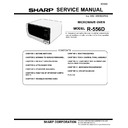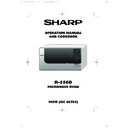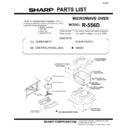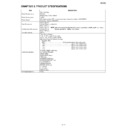Sharp R-556D (serv.man2) Service Manual ▷ View online
CHAPTER 1. BEFORE SERVICING
CHAPTER 2. WARNING TO SERVICE PERSONNEL
CHAPTER 3. PRODUCT SPECIFICATIONS
CHAPTER 4. APPEARANCE VIEW
CHAPTER 5. OPERATION SEQUENCE
CHAPTER 6. FUNCTION OF IMPORTANT COMPO-
NENTS
NENTS
CHAPTER 7. TROUBLESHOOTING GUIDE
CHAPTER 8. TEST PROCEDURES
CHAPTER 9. TOUCH CONTROL PANEL ASSEMBLY
CHAPTER 10. COMPONENT REPLACEMENT AND
ADJUSTMENT PROCEDURE
ADJUSTMENT PROCEDURE
CHAPTER 11. MICROWAVE MEASUREMENT
CHAPTER 12. CIRCUIT DIAGRAMS
Parts List
No. S5914R556DPKS
MICROWAVE OVEN
R-556D
SERVICE MANUAL
R556D
MODEL
CONTENTS
SHARP CORPORATION
In interests of user-safety the oven should be restored to its
original condition and only parts identical to those specified
should be used.
original condition and only parts identical to those specified
should be used.
CONTENTS
CHAPTER 1. BEFORE SERVICING
[1] GENERAL IMPORTANT INFORMATION.....1-1
[2] CAUTION MICROWAVE RADIATION ........1-1
[3] WARNING ..................................................1-1
[1] GENERAL IMPORTANT INFORMATION.....1-1
[2] CAUTION MICROWAVE RADIATION ........1-1
[3] WARNING ..................................................1-1
CHAPTER 2. WARNING TO SERVICE PERSONNEL
CHAPTER 3. PRODUCT SPECIFICATIONS
CHAPTER 4. APPEARANCE VIEW
[1] OVEN .........................................................4-1
[2] TOUCH CONTROL PANEL........................4-1
[1] OVEN .........................................................4-1
[2] TOUCH CONTROL PANEL........................4-1
CHAPTER 5. OPERATION SEQUENCE
[1] OFF
[1] OFF
CONDITION .......................................5-1
[2] MICROWAVE COOKING CONDITION ......5-1
[3] POWER OUTPUT REDUCTION................5-1
[3] POWER OUTPUT REDUCTION................5-1
CHAPTER 6. FUNCTION OF IMPORTANT COMPO-
NENTS
[1] DOOR OPEN MECHANISM.......................6-1
[2] 1ST. LATCH SWITCH AND 2ND. INTER-
NENTS
[1] DOOR OPEN MECHANISM.......................6-1
[2] 1ST. LATCH SWITCH AND 2ND. INTER-
LOCK RELAY CONTROL SWITCH............6-1
[3] MONITOR
SWITCH
...................................6-1
[4] FUSE
F10A ................................................6-1
[5] HIGH
VOLTAGE
FUSE
..............................6-1
[6] OVEN TEMPERATURE FUSE ...................6-1
[7] MAGNETRON
[7] MAGNETRON
TEMPERATURE
FUSE......6-1
[8] TURNTABLE
MOTOR ................................6-1
[9] FAN
MOTOR ..............................................6-1
[10] NOISE FILTER ...........................................6-1
CHAPTER 7. TROUBLESHOOTING GUIDE
[1] FOREWORD ..............................................7-1
[2] CHART .......................................................7-1
[1] FOREWORD ..............................................7-1
[2] CHART .......................................................7-1
CHAPTER 8. TEST PROCEDURES
[1] Procedure A: MAGNETRON TEST ............8-1
[2] Procedure
[1] Procedure A: MAGNETRON TEST ............8-1
[2] Procedure
B:
HIGH VOLTAGE TRANS-
FORMER TEST..........................................8-1
[3] Procedure C: HIGH VOLTAGE RECTIFI-
ER TEST ....................................................8-2
[4] Procedure D: HIGH VOLTAGE CAPACI-
TOR TEST ..................................................8-2
[5] Procedure E: SWITCH TEST .....................8-2
[6] Procedure F: TEMPERATURE FUSE
[6] Procedure F: TEMPERATURE FUSE
TEST ..........................................................8-2
[7] Procedure G: MOTOR WINDING TEST.....8-3
[8] Procedure H: FUSE F10A ..........................8-3
[9] Procedure I: NOISE FILTER TEST.............8-3
[10] Procedure J: HIGH VOLTAGE FUSE
[8] Procedure H: FUSE F10A ..........................8-3
[9] Procedure I: NOISE FILTER TEST.............8-3
[10] Procedure J: HIGH VOLTAGE FUSE
TEST ..........................................................8-3
[11] Procedure K: TOUCH CONTROL PANEL
ASSEMBLY TEST ......................................8-3
[12] Procedure L: KEY UNIT (MEMBRANE
SWITCH) TEST ..........................................8-4
[13] Procedure M: RELAY TEST........................ 8-4
[14] Procedure N: PROCEDURES TO BE TAK-
[14] Procedure N: PROCEDURES TO BE TAK-
EN WHEN THE FOIL PATTERN ON THE
PRINTED WIRING BOARD (PWB) IS
OPEN.......................................................... 8-5
PRINTED WIRING BOARD (PWB) IS
OPEN.......................................................... 8-5
CHAPTER 9. TOUCH CONTROL PANEL ASSEM-
BLY
[1] OUTLINE OF TOUCH CONTROL PANEL
BLY
[1] OUTLINE OF TOUCH CONTROL PANEL
..... 9-1
[2] DESCRIPTION
OF
LSI ............................... 9-1
[3] SERVICING FOR TOUCH CONTROL
PANEL ........................................................ 9-3
[4] PRECAUTIONS FOR USING LEAD-
FREE SOLDER .......................................... 9-4
CHAPTER 10. COMPONENT REPLACEMENT AND
ADJUSTMENT PROCEDURE
[1] BEFORE
ADJUSTMENT PROCEDURE
[1] BEFORE
OPERATING ............................. 10-1
[2] OUTER CASE REMOVAL ........................ 10-1
[3] HIGH VOLTAGE TRANSFORMER RE-
[3] HIGH VOLTAGE TRANSFORMER RE-
MOVAL ..................................................... 10-2
[4] HIGH VOLTAGE RECTIFIER ASSEMBLY,
HIGH VOLTAGE FUSE AND HIGH VOLT-
AGE CAPACITOR REMOVAL .................. 10-2
AGE CAPACITOR REMOVAL .................. 10-2
[5] MAGNETRON
REMOVAL ........................ 10-2
[6] POSITIVE LOCK CONNECTOR (NO-
CASE TYPE) REMOVAL .......................... 10-2
[7] CONTROL PANEL ASSEMBLY REMOV-
AL ............................................................. 10-3
[8] GRAPHIC SHEET AND MEMBRANE
SWITCH REPLACEMENT........................ 10-3
[9] TURNTABLE
MOTOR
REMOVAL ............ 10-3
[10] COOLING FAN MOTOR REMOVAL......... 10-4
[11] POWER SUPPLY CORD REPLACE-
[11] POWER SUPPLY CORD REPLACE-
MENT........................................................ 10-4
[12] 1ST. LATCH SWITCH, 2ND. INTERLOCK
RELAY CONTROL SWITCH AND MONI-
TOR SWITCH ADJUSTMENT .................. 10-5
TOR SWITCH ADJUSTMENT .................. 10-5
[13] 1ST. LATCH SWITCH, 2ND. INTERLOCK
RELAY CONTROL SWITCH AND MONI-
TOR SWITCH ADJUSTMENT .................. 10-5
TOR SWITCH ADJUSTMENT .................. 10-5
[14] DOOR REPLACEMENT ........................... 10-5
CHAPTER 11. MICROWAVE MEASUREMENT
[1] PREPARATION..........................................11-1
[2] PROCEDURE............................................11-1
[1] PREPARATION..........................................11-1
[2] PROCEDURE............................................11-1
CHAPTER 12. CIRCUIT DIAGRAMS
[1] Oven
[1] Oven
Schematic ....................................... 12-1
[2] Pictorial
Diagram
(Figure S-1) .................. 12-2
[3] Control
Unit
Circuit (Figure S-2) ............... 12-3
[4] Printed Wiring Board (Figure S-3) ............ 12-4
Parts List
R556D
1 – 1
R556D
Service Manual
CHAPTER 1.
BEFORE SERVICING
[1] GENERAL IMPORTANT INFORMATION
This Manual has been prepared to provide Sharp Corp. Service engineers with Operation and Service Information.
It is recommended that service engineers carefully study the entire text of this manual, so they will be qualified to render satisfactory customer ser-
vice.
vice.
[2] CAUTION MICROWAVE RADIATION
DO NOT BECOME EXPOSED TO RADIATION FROM THE MICROWAVE GENERATOR OR OTHER PARTS CON-
DUCTING MICROWAVE ENERGY.
Service engineers should not be exposed to the microwave energy which may radiate from the magnetron or other
microwave generating devices if it is improperly used or connected. All input and output microwave connections,
waveguides, flanges and gaskets must be secured. Never operate the device without a microwave energy absorbing
load attached. Never look into an open waveguide or antenna while the device is energized.
DUCTING MICROWAVE ENERGY.
Service engineers should not be exposed to the microwave energy which may radiate from the magnetron or other
microwave generating devices if it is improperly used or connected. All input and output microwave connections,
waveguides, flanges and gaskets must be secured. Never operate the device without a microwave energy absorbing
load attached. Never look into an open waveguide or antenna while the device is energized.
[3] WARNING
Never operate the oven until the following points are ensured.
(A) The door is tightly closed.
(B) The door brackets and hinges are not defective.
(C) The door packing is not damaged.
(D) The door is not deformed or warped.
(E) There is not any other visible damage with the oven.
Servicing and repair work must be carried out only by trained service engineers.
(A) The door is tightly closed.
(B) The door brackets and hinges are not defective.
(C) The door packing is not damaged.
(D) The door is not deformed or warped.
(E) There is not any other visible damage with the oven.
Servicing and repair work must be carried out only by trained service engineers.
All the parts marked "
" on parts list are used at voltages more than 250V.
Removal of the outer wrap gives access to potentials above 250V.
All the parts marked "*" on parts list may cause undue microwave exposure, by themselves, or when they are damaged,
loosened or removed.
All the parts marked "*" on parts list may cause undue microwave exposure, by themselves, or when they are damaged,
loosened or removed.
WARNING: THIS APPLIANCE MUST BE EARTHED
IMPORTANT
THE WIRES IN THIS MAINS LEAD ARE COLOURED IN ACCORDANCE WITH THE FOLLOWING CODE:
GREEN-AND-YELLOW---------------EARTH
BLUE------------------------------------NEUTRAL
BROWN----------------------------------------LIVE
R556D
2 – 1
R556D
Service Manual
CHAPTER 2.
WARNING TO SERVICE PERSONNEL
Microwave ovens contain circuitry capable of producing very high voltage and current, contact with any part of the high voltage circuit will result in
electrocution. High voltage capacitor, High voltage transformer, Magnetron, High voltage rectifier assembly, High voltage fuse, High voltage harness.
electrocution. High voltage capacitor, High voltage transformer, Magnetron, High voltage rectifier assembly, High voltage fuse, High voltage harness.
REMEMBER TO CHECK 3D
1) Disconnect the supply.
2) Door opened, and wedged open.
3) Discharge the high voltage capacitor.
WARNING: AGAINST THE CHARGE OF THE HIGH-VOLTAGE
CAPACITOR
The high-voltage capacitor remains charged about 60 sec-
onds after the oven has been switched off. Wait for 60 sec-
onds and then short-circuit the connection of the high-
voltage capacitor (that is, of the connecting lead of the
high-voltage rectifier) against the chassis with the use of
an insulated screwdriver.
onds after the oven has been switched off. Wait for 60 sec-
onds and then short-circuit the connection of the high-
voltage capacitor (that is, of the connecting lead of the
high-voltage rectifier) against the chassis with the use of
an insulated screwdriver.
Sharp recommend that wherever possible fault-finding is carried out
with the supply disconnected. It may, in some cases, be necessary to
connect the supply after the outer case has been removed, in this
event carry out 3D checks and then disconnect the leads to the pri-
mary of the power transformer. Ensure that these leads remain iso-
lated from other components and the oven chassis. (Use insulation
tape if necessary.) When the testing is completed, carry out 3D checks
and reconnect the leads to the primary of the high voltage transformer.
with the supply disconnected. It may, in some cases, be necessary to
connect the supply after the outer case has been removed, in this
event carry out 3D checks and then disconnect the leads to the pri-
mary of the power transformer. Ensure that these leads remain iso-
lated from other components and the oven chassis. (Use insulation
tape if necessary.) When the testing is completed, carry out 3D checks
and reconnect the leads to the primary of the high voltage transformer.
REMEMBER TO CHECK 4R
1) Reconnect all leads removed from components during testing.
2) Replace the outer case (cabinet).
3) Reconnect the supply.
4) Run the oven. Check all functions.
Microwave ovens should not be run empty. To test for the presence of
microwave energy within a cavity, place a cup of cold water on the
oven turntable, close the door and set the power level to HIGH
(100%). And set the microwave timer for two (2) minutes. When the
two minutes has elapsed (timer at zero) carefully check that the water
is now hot. If the water remains cold, carry out 3D checks and re-
examine the connections to the component being tested.
microwave energy within a cavity, place a cup of cold water on the
oven turntable, close the door and set the power level to HIGH
(100%). And set the microwave timer for two (2) minutes. When the
two minutes has elapsed (timer at zero) carefully check that the water
is now hot. If the water remains cold, carry out 3D checks and re-
examine the connections to the component being tested.
When all service work is completed and the oven is fully assembled, the microwave power output should be checked and microwave leakage test
should be carried out.
should be carried out.




